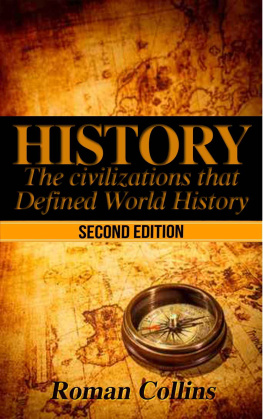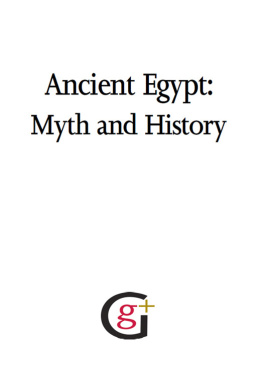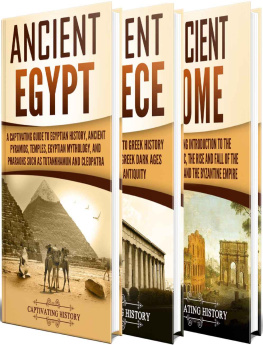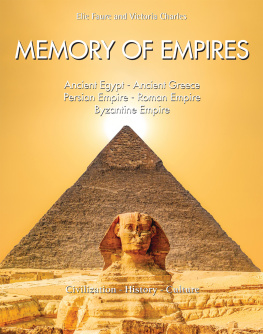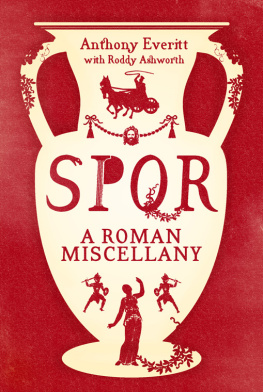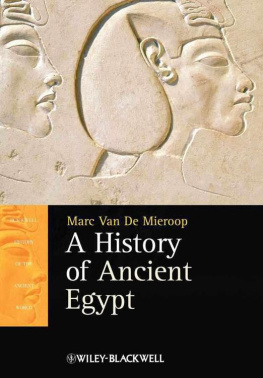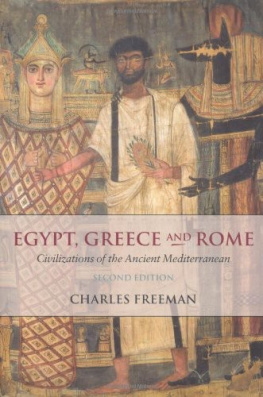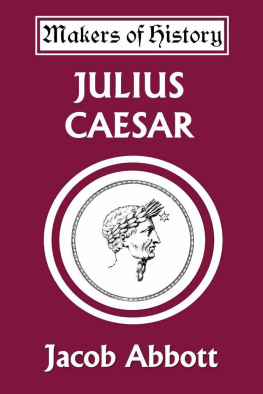Ancient civilizations have long been a fascinating subject to read about. Perhaps because they are shrouded in mystery and time, unreachable, is what makes them so incredibly wonderful to learn. Stretching back into the far reaches of time, they are another world away, another time.
However, in this book I will take you on a fascinating journey throughout thousands of years, and introduce you to some of the worlds most intriguing and mesmerizing civilizations the world has ever known. Some you may know a thing or two about, others may be somewhat unfamiliar. You will learn about the archaeology, the cultures, the languages, the rise and subsequent falls of these empires.
I hope you enjoy. Please feel free to share this book with your friends and family. Please also take the time to write a short review on Amazon to share your thoughts.
Ancient Egypt
Introduction
Around five thousand years ago, a series of independent city states thriving along the banks of the River Nile came together and were finally ruled under one leader, known as the pharaoh. All at once, this newly emerged civilization would go on to become one of the best-known ancient civilizations the world has ever known. For nearly 30 centuries, the Egyptian civilization was the most sophisticated and superior civilization in the Mediterranean world.
Egypt, even in ancient times, was a fascinating kingdom and many foreigners found themselves drawn to it. Over various points during Egyptian history the country was attacked by outsiders including the Nubians, Hittites, and even the Greeks. In 332 BCE, Egypt was conquered by Alexander the Great and would continue to be ruled by his Greek generals who became Egyptian pharaohs until the death of Queen Cleopatra VII when Egypt fell under the control of the Roman Empire.
After Egypt became part of the Roman Empire, its unique culture was quickly submerged by levels of Greek, Roman and Arabic customs and history and the once powerfully inspiring Egyptian legacy faded into obscurity. It was only the stone monuments and ruins of ancient temples with strange hieroglyphs that hinted at the countrys past.
However, around 2000 years after Ancient Egypt disappeared, the hieroglyphs were finally decoded and Egyptology, the study of Ancient Egypt, is still one of the top historical subjects amongst universities all over the world. While Classical Greek and Classical Latin are becoming less popular subjects, people are choosing to learn how to read ancient hieroglyphs and holidays to Egypt are a popular choice of destination. Ancient Egyptian artifacts are being sent to museums all over the world, drawing in large crowds of eager audiences wanting to view them in order to see the beauty and the wonder of ancient Egyptian craftsmanship and technology.
Culture
To understand the Egyptian way of life is to understand their perceptions of death. Life in Egypt was incredibly difficult five thousand years ago and the River Nile was the life of the people. Agriculture was an important part of the Egyptian society. As mentioned earlier, farmers formed the major portion of the population. The Nile flooded its banks regularly every year and this meant that the banks were deposited with rich, fertile soil. This aided in cultivating many plants. Wheat and barley were the major grains grown for consumption. These were mainly used to make beer and bread. Vegetables such as scallions, garlic, cucumbers and some types of gourds and melons were grown for consumption. Other vegetables such as papyrus and turnip were grown for consumption and making other products. Fruits such as dates, figs and grapes were common in Egypt. Meat was also a part of the daily diet. The most common meat varieties were quail, partridge, pigeon, geese and ducks. Chickens were introduced into the diet during the Greco-Roman period. Animal meat that was common was goat, sheep and pigs. Beef was expensive as cows and oxen were considered holy animals in Egypt.
The Nile was the source of their water supply, means of transportation, and its annual inundation allowed the crops to grow and was home to fish, an important food supply. Without the Nile, there was no life. The Egyptians year revolved around the Nile, with the waters beginning to rise in July, which coincided with the rising of the Dog Star Sirius, known to the Egyptians as Sothis, which marked the beginning of the year.
The society in ancient Egypt was divided into many hierarchical levels, depending on their profession. People were ranked in the society based on the importance of their profession. The lowest of the ranks were the slaves, while the slaves were allowed to work or pay their way to freedom; they rarely had enough to live by. The next tier were the farmers, they formed the majority of the population in Egypt. They were working in a system where they were paid on the basis of their work and not a steady salary. They were subjected to labor taxes and the yield of the land belonged to the state or the nobility who owned that piece of land. The next tier were the craftsmen and artists, even when they were above the farmers, they were subjected to the same labor laws as the farmers. Their shops were attached to the temples and they were paid from the treasury. The next higher tier consisted of the officials and scribes. Officials such as tax collectors were part of this class. Scribes were an integral part of the society, they were responsible for keeping records, maintaining reports, writing up laws and maintaining communication. They were part of what was called the white kilt class. This was due to the white linen kilt they wore. The second highest tier consisted of the engineers, physicians and priests. They were an integral part of the society as well, engineers were responsible for the construction of canals, houses and the highest of the engineers were tasked to design and oversee the building of the pyramids. The physicians were tasked with the health of the people and the highest of the physicians worked closely with the Pharaoh and the royal family. The highest tier of the society consisted of the pharaoh and the nobility.

